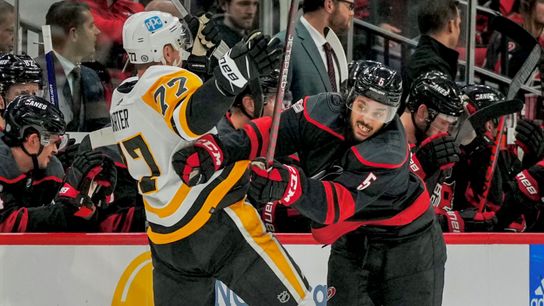There are common refrains from fans in the comment sections or on social media anytime the Penguins lose a game.
Sit this player, trade that player, send another one down to the minors.
Without fail, one of the common refrains that pops up is that the Penguins should buy out Jeff Carter, whose contract runs through next season and carries a $3.125 million cap hit.
No, it's not happening. For one, nobody is getting bought out midseason. The NHL restricts buyouts to two designated periods during the offseason calendar. But even looking ahead to this coming summer, don't expect the Penguins to buy out Carter.
The reason why is pretty straightforward and should put any talk of the Penguins doing so to rest.
In most cases, buyouts reduce the cap hit of the player who is bought out, with the ensuing cap penalties being spread out over a period of double the number of years that were on the player's contract at the time of the buyout. If a player is younger than 26 years old, a team has to pay out one-third of the remaining salary on the contract, and if the player is older than 26 then the team pays out two-thirds of the remaining salary. Signing bonuses are paid out in full. The actual cap hit of the buyout varies from year-to-year and is the result of a mildly-complicated formula.
Because of the long-term effects, teams have to weigh the decision of if it's really that worth it to get rid of a player's contract. The Penguins have only used a buyout once before, buying out the remaining three years of Jack Johnson's contract in 2020. It's a choice that they're paying for through 2026, and one that costs $1,916,667 in dead salary cap space this season alone.
Buyouts can sometimes be an option when a player has a no-movement clause, which is why I suspect this always comes up in regards to Carter. Carter has a full no-movement clause, which means he can't be traded or assigned to the minors without his consent. No-movement clauses have no effects on buyouts, however.
It's a different part of Carter's contract structure that essentially makes his contract buyout-proof.
The NHL has rules surrounding what are called "35+ contracts," which aim to prevent teams from signing older players to longer contracts at lowered average annual values, with no intention of seeing the player play through to the end of that contract.
If a player signs a multi-year contract after the age of 35 and the contract is either front-loaded in terms of the year-to-year base salary breakdown, or has signing bonuses beyond the first year, then it's considered a true 35+ contract. The result is that the player's cap hit remains in full in the event of a buyout or early retirement during the contract.
Carter's contract doesn't have signing bonuses at all written into it. But it is front-loaded -- he gets paid $3.25 million this season and $3 million next season.
It's definitely something Carter's side would have pushed for in contract negotiations, but why? Did he really need that $125,000 to be moved to this season's salary instead of next year's?
In this case, structuring the salary in that way is less about Carter wanting the benefit of getting that fraction of his total salary earlier. But rather, front-loading the contract in even such a tiny amount ensures that his contract is a 35+ contract and offers him additional protection. It means that a buyout or retirement won't reduce his salary cap hit, making the contract essentially fully-guaranteed and buyout proof.
The Penguins could "buy out" Carter this summer, but the result would be his $3.125 million cap hit counting in full next season just as if he were still on the team. It's not happening.
It's a bit of a mystery why Carter was given so many protections in his deal at his age, between the full no-movement clause and the making the contract a 35+ contract. With a $3.125 million average annual value, Carter's making pretty good money for a 38-year-old in the league. His last contract was signed in his prime in 2010 and had a $5,272,727 average annual value, though the Kings retained half of that in the trade to Pittsburgh, making his initial cap hit with the Penguin just $2.6 million. He hadn't had a base salary over $3 million since the 2018-19 season, so he essentially got a raise this season even if the overall cap hit is lower.
Even if the Penguins really wanted Carter back for two more years after last season, it's hard to imagine he'd have had many (if any) better offers elsewhere than $3.125 million. The teams with ample cap space in this flat-cap era are generally the younger, rebuilding teams that would have no use for a player like Carter. It's hard to imagine a contender offering Carter more money. The Penguins might have been able to get him back at that salary just fine without giving him the additional buyout protection and no-movement clause.
They're unnecessary parts of his contract structure that go a long way toward limiting the Penguins' ability to improve their bottom-six at this point.
